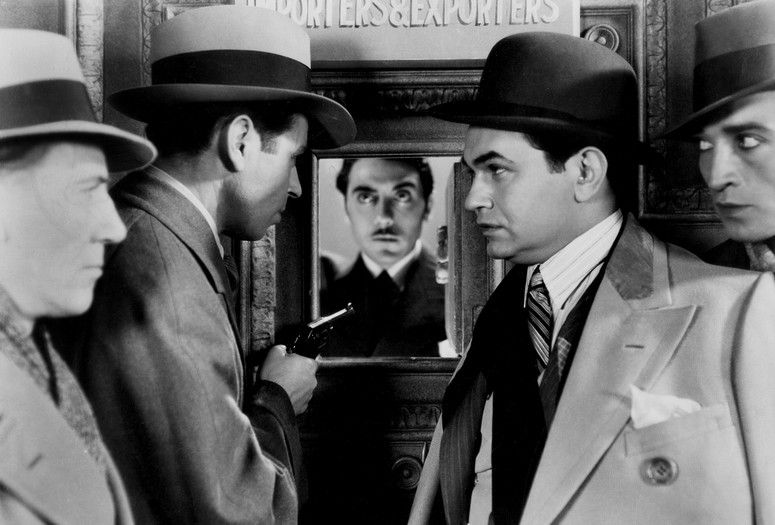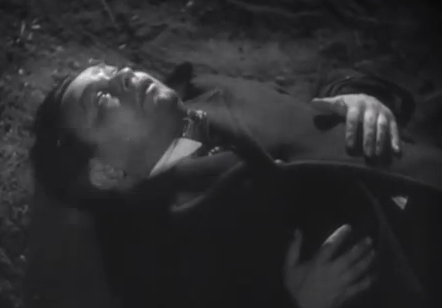The emergence of the gangster genre back in the 1930s in the United States was no coincidence. The Depression hitting the market and the new Prohibition Act helped shape how the people viewed the gangster genre. There’s no doubt that movies such as Pulp Fiction or The Godfather have left a huge mark on the film industry, but without Edward. G. Robinson perfectly embodying the nature of a tragic hero inspired by the Italian gangster Al Capone in Little Caesar, there would be no such movies in the future.Little Caesar is considered to be one of the earliest gangster movies ever created, alongside The Public Enemy (1931) and Scarface. It was released only after a few years of sound becoming an inevitable part of movies. It follows the journey of two best friends, Caesar Enrico “Rico” Bandello and Joe Massara, who are trying to turn their small criminal activities into something big, by moving to Chicago. The contrast between the power-driven Rico and Joe, who just wants to become a professional dancer with his girlfriend Olga, plays a significant role as the movie progresses. Here are the reasons why Little Caesar is one of the best gangster movies of all time.
The Historical Significance of Little Caesar
What truly makes Little Caesar so special is the time period that it was produced in. The destructivness of alcohol and its overall increased consumption forced the US Consitution to act accordingly and prohibit the manufacture, transfer and selling of alcohol under the Prohibition Act of 1918. Over a decade later The Wall Street Crash happened, which eventually led to the Great Depression. The Prohibition Act didn't forbid the consumption of the alcohol though, which created the opportunity for illegal activities and helped gangs rise to their power. In addition to everything else, the economic collapse constructed an immense difference between the rich and the poor. Not only is Rico one of the first main gangster characters, he also embodies how people back then viewed immorality as their only way to success.
Rico’s Disillusioned Idea of The American Dream
The idea of the optimistic outlook on life that has always been a big part of the American culture was destroyed when people realized how quickly the economy could crumble. This eventually resulted in mass unemployment and starvation. Little Caesar's revelation that the American dream is only for the wealthy helped people sympathize with the gangster hero who managed to find his own way of making money and provide for himself. Rico also possesses big dreams of moving to Chicago, wanting to be just like the famous gangster “Diamond” Pete Montana, but once reaching the top, he falls back down. The movie excellently portrays that, yes, you can achieve your dreams through hard work, but not when you're labeled as alllienated.
The Material Greed of An Urban Gangster
Craving wealth, fame and goods is a repetitive pattern in the gangster genre. The story normally takes place in an urban city and the anti-hero is constantly surrounded by women and expensive material things. However, what's fascinating about Rico's character is the awkwardness he carries with him, as if he didn't quite fit into the underworld despite his efforts and convincing actions. Even after taking over the Vettori gang and having a banquet organized in his name like he's always wanted, we see him desirably eye his boss Big Boy's luxury things in his house as if they were unreachable to him. He essentially never has enough of anything.
Little Caesar as An Italian Immigrant Gangster
The opening scene rolls. Rico and Joe sit at a bar as they order spaghetti and coffee with strong accents and we instantly know we’re dealing with Italian-American immigrants. What’s a more effective way to portray the distorted image of the American dream than using an Italian immigrant who has already been failed by the system? It's very common to depict gangsters in American movies as foreign - etc. Tony Montana in Scarface whose Italian background is very evident throughout the movie - but what marks the significance of Little Caesar is the fact the movie was released only a few years after the introduction of sound. That way the audience could not only see and read, but also hear the alienism for the first time.
Rico Is A Timeless Relatable Hero
Of course people don't fully relate themselves to Rico, but in a way, gangster characters fulfil our deepest fantasies of stepping out of the capitalistic system and achieving our dreams outside of a set barrier.The audience didn’t see Rico as a vicious criminal, but as a victim of the system who used the only resources he had to get what he had been promised. To preserve the fake ideals created by the society, the gangster movies had to make sure the tragic hero was met with a grand downfall at the end.
“Mother of Mercy. Is This The End of Rico?”
Every gangster needs to be punished for his crimes at the end and with Rico, it is no different. But, the poeticism of this ending scene is remarkable. While Rico says his last words before dying, we can see the poster of a performance by his best friend Joe and his girlfriend Olga, hanging right on the wall above him. The movie directly adresses the audience and ironically shows them that fame and wealth can only be obtained morally.

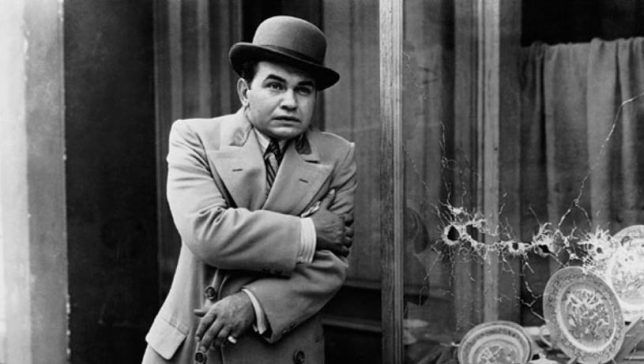
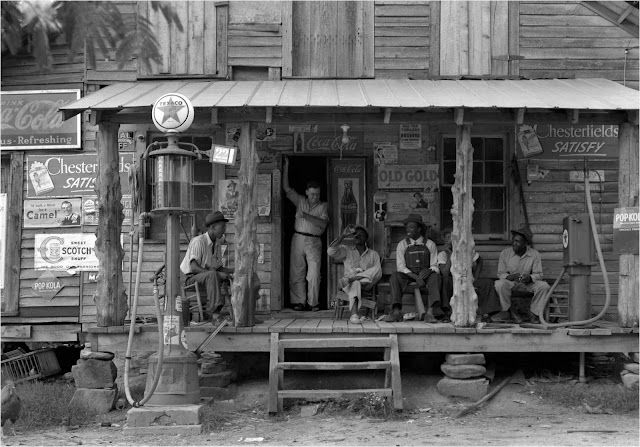
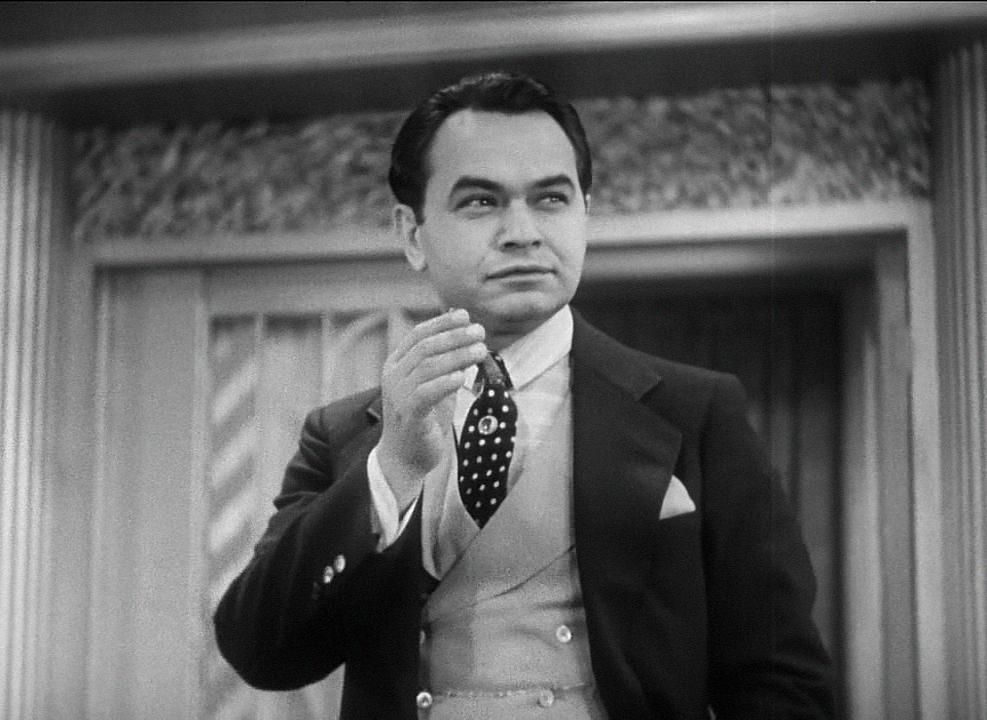
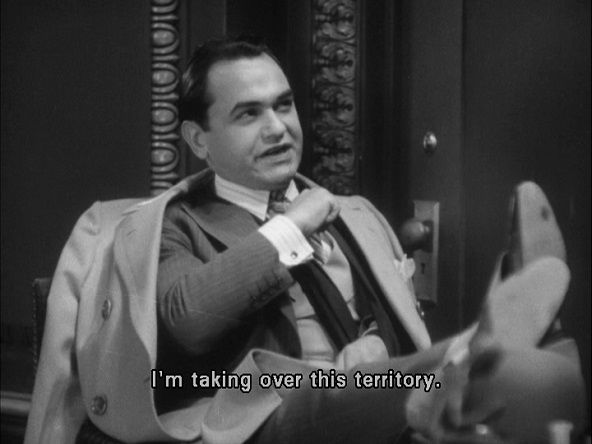
_Warner_BrosStudios_Publicity_still_L_to_R_Mervyn_LeRoy_(director)_actor_Edward_G_Robinson.jpg)
